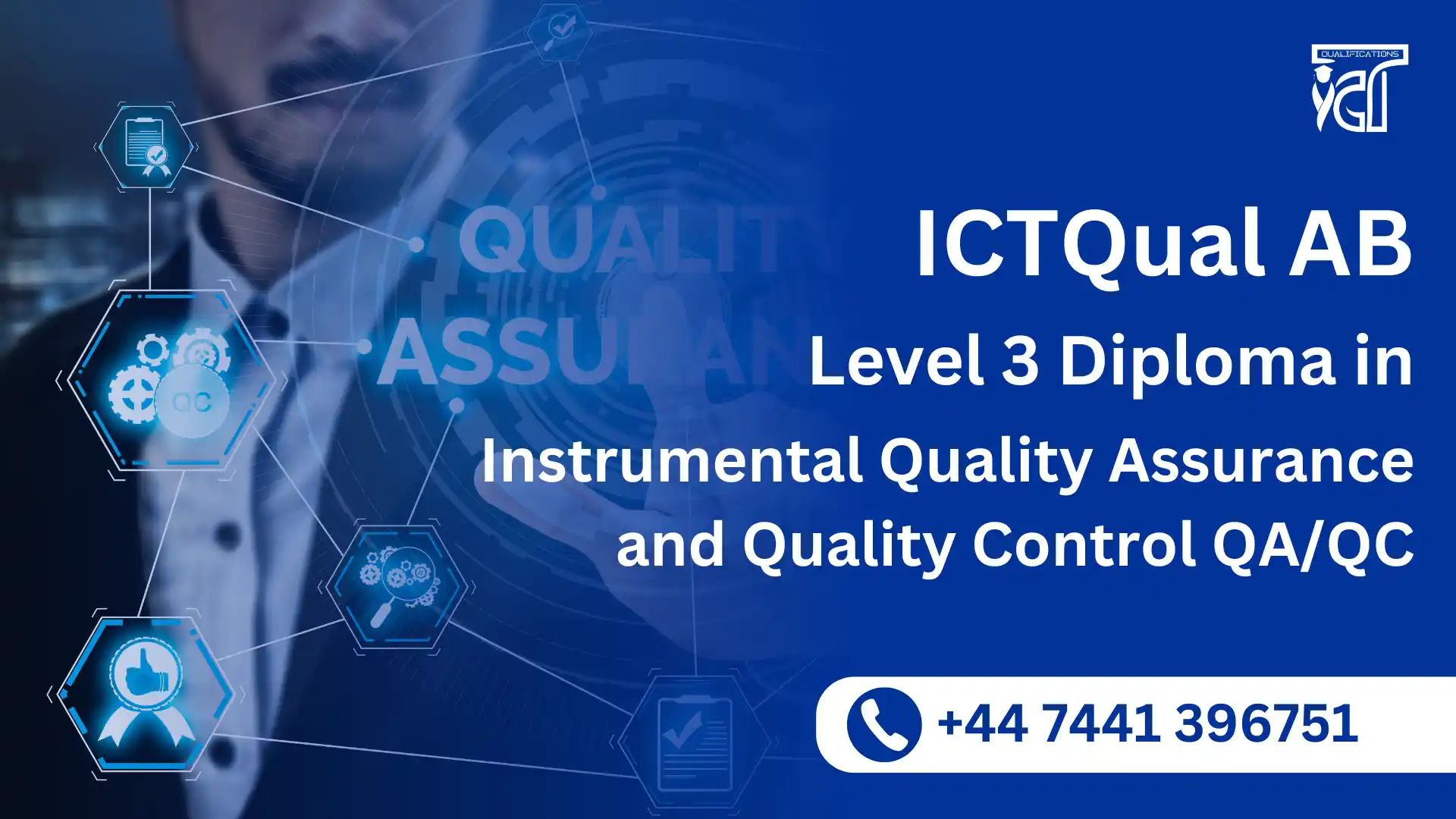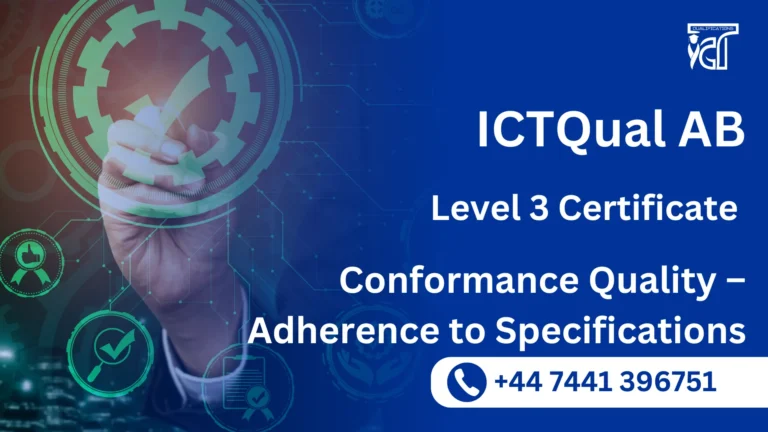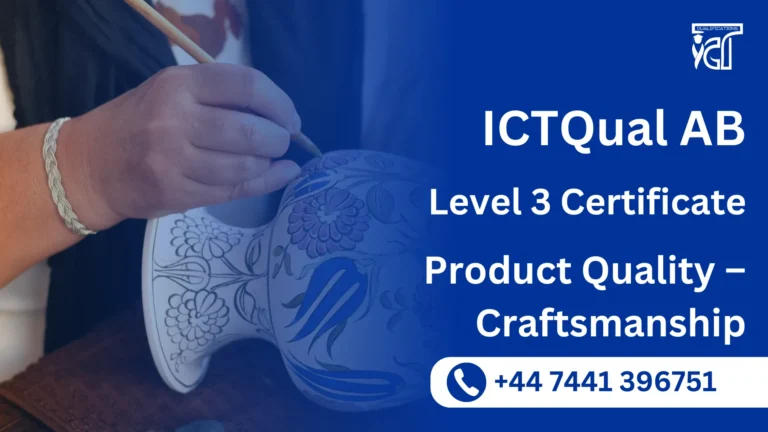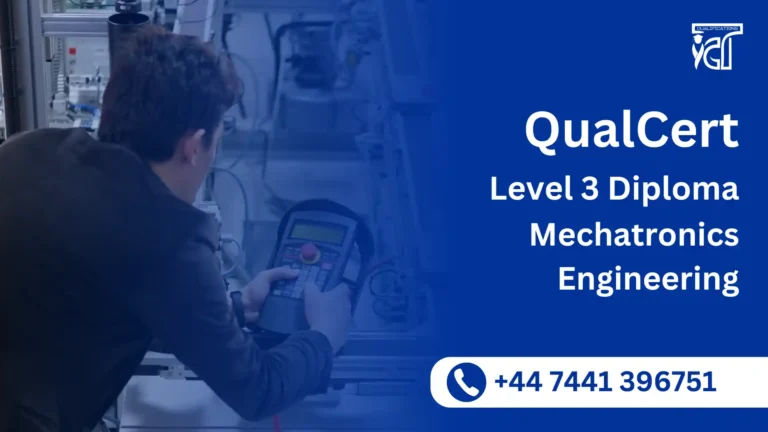The ICTQual AB Level 3 Diploma in Instrumental Quality Assurance and Quality Control (QA/QC) is a foundational qualification designed to prepare learners for technical roles in quality management across industrial and manufacturing sectors. This diploma provides essential knowledge and practical skills in QA/QC processes, ensuring learners can contribute effectively to maintaining product integrity, compliance, and industry standards.
Learners will gain a strong understanding of quality assurance principles, inspection methods, and quality control techniques. The course introduces key concepts such as measurement accuracy, calibration, testing procedures, and documentation practices. By combining theoretical learning with practical applications, the diploma ensures graduates are equipped to meet the demands of modern quality-driven industries.
A strong emphasis is placed on international standards, regulatory compliance, and workplace safety. Through case studies and applied learning, learners develop the ability to identify quality issues, implement corrective actions, and support continuous improvement processes. This practical approach enhances both technical competence and employability.
The qualification is particularly suited for individuals seeking entry-level roles in QA/QC, technicians aiming to formalize their skills, and professionals transitioning into quality-focused positions. It provides learners with the confidence to work in industries where precision, reliability, and compliance are critical, such as oil & gas, construction, pharmaceuticals, and manufacturing.
Beyond immediate employment opportunities, the ICTQual AB Level 3 Diploma also serves as a stepping stone to higher-level qualifications in quality assurance, quality control, and industrial management. Graduates are well-positioned for career progression, advanced certifications, and continuous professional development, making this diploma a valuable investment for long-term success in the field of QA/QC.
ICTQual AB Level 3 Diploma in Instrumental Quality Assurance and Quality Control QA/QC
This qualification, the Level 3 Diploma in Instrumental Quality Assurance and Quality Control QA/QC, consists of 6 mandatory units.
- Principles of Instrumental Quality Assurance and Inspection
- Material Receiving, Handling, and Preservation
- International Codes and Standards for Instrumentation
- Instrument Tubing and Installation Practices
- Instrument Elements and Process Variables
- Loop Checking, Testing, and Commissioning
Learning Outcomes for the Level 3 Diploma in Instrumental Quality Assurance and Quality Control QA/QC:
Principles of Instrumental Quality Assurance and Inspection
- Explain the fundamental concepts of Quality Assurance (QA) and Quality Control (QC) in instrumentation.
- Develop and interpret Inspection Test Plans (ITPs) for instrumentation projects.
- Use inspection checklists to verify compliance with project specifications.
- Identify and apply different levels of inspection in industrial projects.
- Maintain accurate QA/QC documentation and reporting records.
- Recognise the importance of compliance with international standards in inspection activities.
- Apply systematic inspection techniques to ensure quality and safety.
- Demonstrate awareness of the inspector’s role in project success.
Material Receiving, Handling, and Preservation
- Inspect incoming materials against purchase orders and specifications.
- Verify material certificates and documentation for compliance.
- Apply correct procedures for receiving and storing instrumentation materials.
- Implement preservation techniques to protect sensitive equipment.
- Identify non‑conforming materials and report appropriately.
- Maintain traceability of materials throughout the project lifecycle.
- Follow international best practices for safe handling and storage.
- Ensure readiness of materials for installation and inspection.
International Codes and Standards for Instrumentation
- Interpret and apply NEMA VE‑1/VE‑2 standards for cable trays.
- Apply NEC‑250 grounding requirements in instrumentation projects.
- Explain conduit system requirements (RMS, FMT, RGS, IMT) as per NEC Articles 344–400.
- Identify compliance requirements for junction boxes and cabinets under NEMA standards.
- Evaluate the importance of adhering to international codes in QA/QC.
- Compare national and international standards for instrumentation installations.
- Apply standards to ensure safety, reliability, and compliance.
- Document inspections in line with NEC and NEMA requirements.
Instrument Tubing and Installation Practices
- Select appropriate tubing materials for instrumentation applications.
- Apply correct tubing layout, bending, and connection techniques.
- Inspect tubing installations for leaks and compliance with standards.
- Follow Aramco and international standards for tubing practices.
- Identify common tubing faults and propose corrective actions.
- Ensure proper support and routing of tubing systems.
- Maintain documentation of tubing inspections and tests.
- Apply safety practices during tubing installation and inspection.
Instrument Elements and Process Variables
- Identify and describe instrument elements for pressure, flow, temperature, and level.
- Inspect and verify installation of instrument elements against standards.
- Apply Aramco and international QA/QC requirements to instrumentation.
- Calibrate basic instrument elements to ensure accuracy.
- Recognise the role of process variables in industrial operations.
- Document inspection and calibration results accurately.
- Troubleshoot common issues with instrument elements.
- Ensure compliance with safety and operational standards.
Loop Checking, Testing, and Commissioning
- Explain the purpose and process of loop checking in instrumentation systems.
- Perform loop checks to verify continuity and functionality.
- Document loop check results in accordance with QA/QC requirements.
- Conduct pre‑commissioning tests on instrumentation systems.
- Apply commissioning procedures to ensure system readiness.
- Identify and resolve issues during testing and commissioning.
- Ensure compliance with international standards during commissioning.
- Contribute to safe handover of fully tested and commissioned systems.
The ICTQual AB Level 3 Diploma in Instrumental Quality Assurance and Quality Control (QA/QC) provides learners with the essential skills and knowledge to begin or strengthen their careers in quality management. This qualification combines theoretical understanding with practical application, ensuring graduates are well-prepared to meet industry standards and contribute effectively to quality-driven organizations.
1. Career Advancement
- Opens doors to entry-level QA/QC roles in industries such as oil & gas, construction, pharmaceuticals, and manufacturing
- Enhances employability with a recognized international qualification
- Provides a competitive edge in recruitment for technical and quality-focused positions
- Builds a foundation for progression into supervisory or specialist QA/QC roles
- Increases opportunities for global employment in quality assurance and control
2. Practical Skills Development
- Gain hands-on expertise in inspection, testing, and calibration procedures
- Learn to apply quality control tools and techniques in real-world scenarios
- Develop the ability to identify defects, implement corrective actions, and ensure compliance
- Strengthen problem-solving and analytical skills for workplace quality challenges
- Build confidence in applying QA/QC processes across different industrial settings
3. Academic and Professional Progression
- Acts as a stepping stone to higher-level qualifications in QA/QC, industrial management, or engineering
- Provides eligibility for advanced diplomas and certifications in quality management
- Supports continuous professional development (CPD) goals for technical staff
- Enhances academic credibility for learners pursuing further study in quality or process engineering
- Builds a strong foundation for specialized training in ISO standards and regulatory compliance
4. Industry-Relevant Knowledge
- Covers essential QA/QC principles including inspection, documentation, and compliance
- Aligns with international quality standards and industry best practices
- Prepares learners for modern industrial environments where quality is critical
- Introduces learners to both theoretical frameworks and applied quality systems
- Ensures knowledge is transferable across multiple industries and global markets
5. Recognition and Credibility
- Earn an internationally respected diploma valued by employers worldwide
- Demonstrates commitment to quality, compliance, and professional growth
- Strengthens credibility in both local and international job markets
- Provides recognition that supports career mobility across industries and countries
- Establishes learners as competent professionals aligned with global QA/QC standards
The ICTQual AB Level 3 Diploma in Instrumental Quality Assurance and Quality Control (QA/QC) is designed for individuals who want to build a career in quality management, inspection, and compliance. It is suitable for learners at the beginning of their professional journey as well as those already working in technical roles who wish to formalize their skills and gain international recognition.
1. Career Aspirations
- Individuals aiming to start a career in QA/QC across industries such as oil & gas, construction, pharmaceuticals, and manufacturing
- Learners seeking stable, long-term employment in technical and quality-focused roles
- Professionals looking to transition into quality assurance and inspection positions
- Those aspiring to progress into supervisory or specialist QA/QC roles in the future
- Learners committed to building a career with international opportunities
2. Educational Background
- Candidates with a secondary school qualification or equivalent
- Learners with a foundation in mathematics, science, or engineering principles
- Individuals who have completed vocational or technical training in related fields
- Students interested in pursuing higher-level qualifications in QA/QC or industrial management
- Those who value structured learning that combines theory with practical application
3. Work Experience and Skills
- Beginners with no prior work experience but a strong interest in quality management
- Technicians or maintenance staff seeking to upskill and gain formal recognition
- Professionals from engineering, production, or process industries transitioning into QA/QC
- Learners with problem-solving and analytical skills who enjoy detail-oriented work
- Individuals eager to develop practical expertise in inspection, testing, and compliance
4. Learning Preferences
- Learners who prefer a balance of classroom theory and hands-on training
- Individuals motivated by real-world case studies and applied learning
- Candidates who value structured, step-by-step progression in technical subjects
- Those who thrive in environments that emphasize safety, accuracy, and compliance
- Learners who want to apply knowledge directly to workplace scenarios
5. Personal Qualities
- Motivated individuals with a strong interest in quality assurance and compliance
- Learners who are detail-oriented and committed to precision in their work
- Candidates with a willingness to adapt to evolving industry standards and regulations
- Individuals who value continuous professional development (CPD)
- Learners determined to achieve international recognition and career growth
The ICTQual AB Level 3 Diploma in Instrumental Quality Assurance and Quality Control (QA/QC) provides learners with a strong foundation for both career and academic growth. Graduates of this qualification can progress into higher-level studies, advanced certifications, and technical roles across industries where quality and compliance are critical.
1. Academic Progression
- Progression to Level 4 and Level 5 Diplomas in QA/QC, industrial management, or engineering
- Eligibility for advanced technical certifications in quality management and inspection
- Foundation for specialized training in ISO standards and regulatory compliance
- Opportunity to pursue higher education in industrial technology or process engineering
- Strengthened academic profile for learners aiming to build a long-term career in quality assurance
2. Career Progression
- Entry into roles such as QA/QC Technician, Quality Inspector, or Junior Quality Engineer
- Pathway to supervisory or specialist QA/QC positions with further training and experience
- Opportunities across industries including oil & gas, construction, pharmaceuticals, and manufacturing
- Increased employability in global markets where quality assurance professionals are in demand
- Potential to transition into roles focused on compliance, auditing, or process improvement
3. Professional Development
- Builds a strong base for continuous professional development (CPD) in QA/QC
- Enhances credibility for membership in professional quality and technical associations
- Supports long-term career growth by aligning with international industry standards
- Encourages adaptability to evolving quality management systems and technologies
- Provides recognition that supports career mobility across industries and countries
4. International Opportunities
- Globally recognized diploma valued by employers in multiple countries
- Increased mobility for learners seeking overseas employment in QA/QC roles
- Alignment with international quality and safety standards for cross-border employability
- Access to global career opportunities in inspection, auditing, and compliance
- Enhanced credibility when applying for further study or certifications abroad
5. Personal Growth and Skills Development
- Development of critical thinking and problem-solving skills in quality management
- Improved confidence in applying QA/QC processes in real-world environments
- Strengthened ability to work independently and as part of a quality-focused team
- Enhanced adaptability to new technologies and international quality standards
- Greater sense of achievement through earning an internationally respected qualification
Entry Requirements
The ICTQual AB Level 3 Diploma in Instrumental Quality Assurance and Quality Control (QA/QC) is designed to be accessible while ensuring learners are prepared for both the theoretical and practical aspects of the qualification. Applicants should meet the following entry requirements:
Minimum Age
- Learners must be at least 16 years of age at the time of enrollment.
- This ensures readiness for technical training and workplace safety standards.
Educational Background
- A secondary school qualification or equivalent is recommended.
- A basic understanding of mathematics, science, or engineering principles is beneficial.
- Candidates with prior vocational or technical training in related fields are encouraged to apply.
Work Experience
- No prior work experience is mandatory, making the diploma suitable for beginners.
- However, individuals with experience in technical, industrial, or maintenance roles will benefit from a smoother transition into QA/QC studies.
- The course is also suitable for technicians seeking to formalize their skills with an internationally recognized qualification.
Language Proficiency
- Learners must demonstrate proficiency in English (or the language of instruction).
- The ability to read, write, and communicate effectively is essential for understanding technical materials, safety regulations, and assessments.
- Applicants may be asked to provide evidence of language proficiency through previous qualifications or equivalent assessments.
Additional Recommendations
- A strong interest in quality assurance, inspection, and compliance.
- Willingness to engage in both theoretical learning and practical training.
- Commitment to continuous professional development (CPD) and career progression in QA/QC.
Register Now
Qualification Process
Qualification Process for the ICTQual AB Level 3 Diploma in Instrumental Quality Assurance and Quality Control QA/QC
- Self-Assessment:
Begin by evaluating your eligibility to ensure you meet the qualification requirements, including work experience, knowledge, and language proficiency. - Registration:
Complete your registration by submitting the required documents, including a scanned copy of a valid ID, and paying the registration fee. - Induction:
An assessor will conduct an induction to confirm your eligibility for the course and explain the evidence requirements. If you do not meet the criteria, your registration will be cancelled, and the fee will be refunded. - Assignments & Evidence Submission:
Provide all assignments and the necessary evidence based on the assessment criteria outlined in the course. If you are unsure of the required evidence, consult with the assessor for guidance on the type and nature of evidence needed. - Feedback and Revision:
The assessor will review your submitted evidence and provide feedback. Evidence that meets the criteria will be marked as “Criteria Met,” while any gaps will be identified. You will be asked to revise and resubmit if needed. - Competence Evidence:
Submit final evidence demonstrating that all learning outcomes have been met. This evidence will be marked as “Criteria Met” by the assessor once it is satisfactory. - Internal Quality Assurance (IQA):
The Internal Quality Assurance Verifier (IQA) will review your evidence to ensure consistency, quality, and compliance with standards. - External Verification:
The IQA will submit your portfolio to ICTQUAL AB External Quality Assurance Verifiers (EQA) for final confirmation. The EQA may contact you directly to verify the authenticity of your evidence. - Certification:
Upon successful completion of all checks, ICTQUAL AB will issue your official certificate, confirming that you have attained the ICTQual AB Level 3 Diploma in Instrumental Quality Assurance and Quality Control QA/QC.







